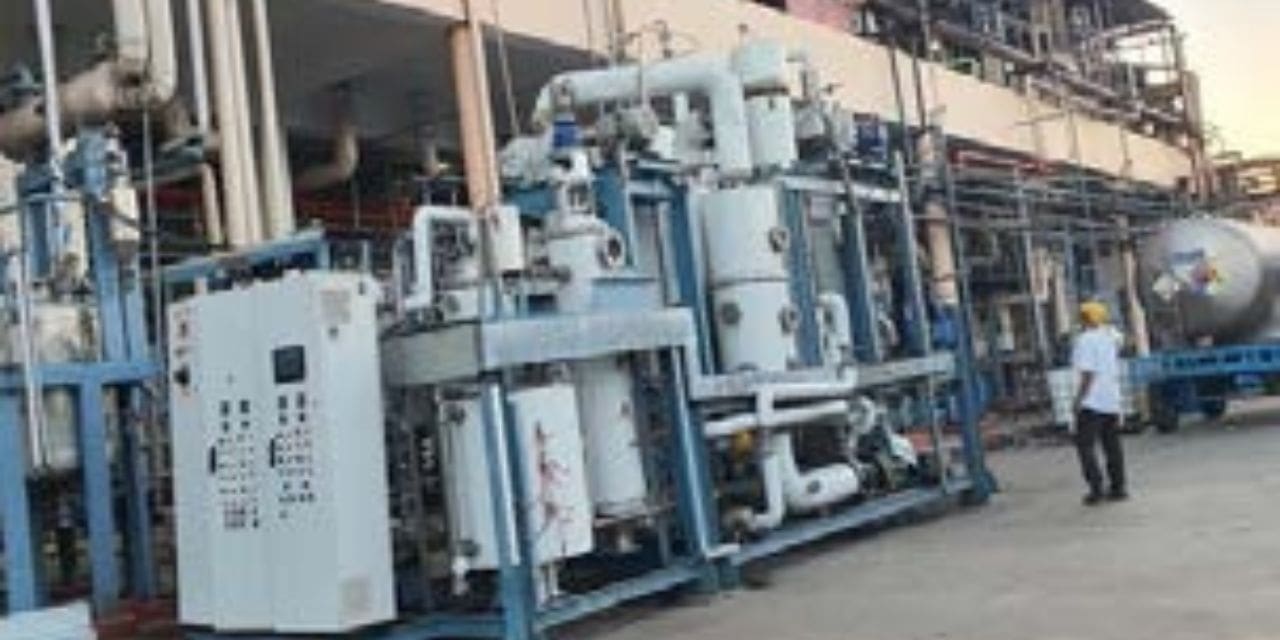
UnitedMizu Industries Pvt. Ltd.’ (UMI) is a well-established and growing engineering company in India. Led by the team of professionals, the company has been supplying innovative Turnkey Zero Liquid Discharge (ZLD) focused on gener- ating profits from waste by utilising minimum energy.
UMI is exhibiting in Hall 14, Booth 1413A at the ITM.
UMI is manufacturing following products: Caustic Re- covery Plants (CRP); Heat Recovery Unit (HRU); Salt Re- covery Plant; Multiple Effect Evaporator Plants (MEE), Mechanical Vapor Recompressor (MVR); Agitated Thin Film Dryers (ATFD), and Solvent Recovery and Stripper Systems
Caustic Recovery Plant (CRP) for Mercerizing Machine
Mercerization is a finishing process in the textile indus- try where the textile fibres are treated under tensile stress with caustic soda. Large quantities of diluted caustic soda (weak lye) are a waste product of this pro- cess. UMI Caustic Recovery Plants (CRP) can turn a very large proportion of this weak lye into reusable concentrated caustic soda (strong lye).
UMI has developed a technology to make get colour- less caustic even from process such as Yarn Dyed OR Denim Mercerization, which has advantages as fol- lows:
- Payback-time is less than one year!
- No alkaline waste water from mercerizing machine
- Generation of hot water from the waste energy
- Generation of soft water, the vapor condensate is slightly alkaline
- Recovery of surplus lye for wet-on-wet mercerizing
- No contamination of the heating steam
- Environmental protection: less chemicals for neutral- ization are needed
Multi Effect Evaporators
Forced Circulation Evaporator used for concentrating high viscosity material and products with higher solids to achieve desired concentration. In this type of evapo- rator, the liquid is pumped through tube side of Calan- dria at high velocity avoiding precipitation and fouling the liquid is then passed through vapor separator for separation of vapor. Concentrated liquid is continuous- ly discharged from bottom of the vapor separator with pump.
Advantages
- Fouling of tubes is minimised; Designed for highest steam economy
- High recirculation is to be maintained inside the tubes by recirculation pump
- High TDS and viscous liquid concentration
- Rising Film Evaporator
- Low pressure drop
Mechanical Vapor Recompressor (MVR)

MVR (Mechanical Vapor Recompression) technology can reduce the energy consumption of the evapora- tion system significantly. The pressure, temperature and enthalpy of the secondary steam generated by evaporation increases after compressed by the steam compressor, then the steam enters the heating room as heat resource, so as to continuously circulate. This type of evaporation system consumes electrical energy for evaporation operations. Energy consumption of compression fan varies slightly, depending on different material properties.
UMI has made a portable Pilot Plant to conduct trails at clients’ site.
Heat Recovery System
With the increasing cost of energy, it is imperative to look at alternatives to save energy. As energy is mon- ey, any savings in energy directly leads to sustainable operations. Environmental impact also needs to be considered to reduce the issue of global warming. In consideration of the dire need of the industry to con- serve and reduce wastage of energy, the company has introduced air-to-air heat recovery units for stenters and dryers.

In any process house hot air stenter and dryers are the most energy consuming system. Apart from the ther- mal energy required for evaporation of water during drying and finishing, considerable amount of energy is lost in the exhaust. This situation leads to various issues. While major issue is the loss of costly thermal energy, it also leads to the heating up of atmosphere, thus adding to the global warming problem which is getting out of hand and which needs to be handled on war-footing.
Solution:
UMI has developed a heat recovery system which re- covers part of the energy in the hot air in the exhaust ducting before it is let off to atmosphere. Significant amount of themal energy is recovered by pre-heating the fresh air. This pre-heated fresh air is fed inside the stenter and dryer chambers. The exhaust air is partially cooled which helps considerably in reducing the global warming problem.
In a typical heat-setting operation, the fresh air at an ambient temperature of 380C gets preheated to about 80-900C with the help of its heat recovery system. The pre-heated air at higher temperature enters in the chamber thereby reducing thermal energy consump- tion considerably.
Sustainability is achieved by maintaining consistency in operations. Performance is monitored with the help of PLC provided with the system.
Ease of operation and maintenance is ensured by has- sle-free removal and cleaning of filter screens. Quick resetting the stenter for production is possible due to on-site cleaning of the heat recovery unit.

